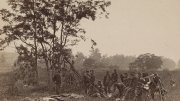The Civil War battle of Antietam remains the most lethal day of combat for Americans in U.S. history. Though “tactically a draw,” Stephen Budiansky, S.M. ’79, writes in his vivid A Day in September: The Battle of Antietam and the World It Left Behind (W.W. Norton, $32.50), it was “a moral victory” for the Union—enough so that Abraham Lincoln could issue the Emancipation Proclamation, and Confederate hopes for recognition by London ended. War “lay[s] bare failings of human nature that, under less trying circumstances, we all usually do a pretty good job of concealing,” he notes. “Those human flaws…are generally reflective of deeper yet also normally hidden flaws in society. That is one of the things that make wars worth studying, and interesting.” From the prologue:
Three days after the Battle of Antietam, Dr. Oliver Wendell Holmes, Boston physician, Harvard anatomist, renowned poet, popular lecturer, genial egotist, creator of the genially egotistical “Autocrat of the Breakfast Table” who entertained the readers of the Atlantic Monthly…was making his way slowly west on the National Road from Frederick, Maryland. Accompanying him were three chance acquaintances he had met on the road, part of a stream of the distraught and curious heading for the battlefield seeking news or corpses of loved ones, bearing aid for the wounded, in a not always disinterested display of philanthropic benevolence, or just to morbidly gawk and collect relics.
Throughout the day of September 17, 1862, telegrams and trains had carried to points hundreds of miles distant rumors of a great battle in Maryland. That night in Boston a loud knock at the door wakened Dr. Holmes from an uneasy sleep. A telegraph boy placed in his hands, in exchange for one dollar and thirteen cents due, the message he had been awaiting with dread anticipation:
Hagerstown 17th
Captain Holmes wounded shot through the neck thought not mortal at Keedysville
William Le Duc…
Dr. Holmes had boarded a train the next morning to New York, then on to Philadelphia and Baltimore, then west across Maryland on the B&O Railroad to Frederick. The only conveyance he could obtain at Frederick was a farm cart pulled by two stolid bays, which he counted himself lucky to find for hire….
Outside of Frederick…approaching the hills and woods of Antietam Creek, signs of the great armies that had passed through began to appear. It was beautiful country, the corn still standing, the wheat already harvested, and the ground neatly plowed. But the fence rails were down and heaps of ashes showed where they had been put to use as camp fires. “The long battle had traveled,” wrote Dr. Holmes, “like one of those tornadoes which tear their path through our fields and villages.” Soon the road was filled with straggling and wounded soldiers, a sight which put Dr. Holmes in mind of another metaphor that would more truly capture what had taken place, and how it would not soon be forgotten. “Just as the battle-field sucks everything into its red vortex for the conflict, so does it drive everything off in long, diverging rays after the fierce centripetal forces have met and neutralized one another.”






